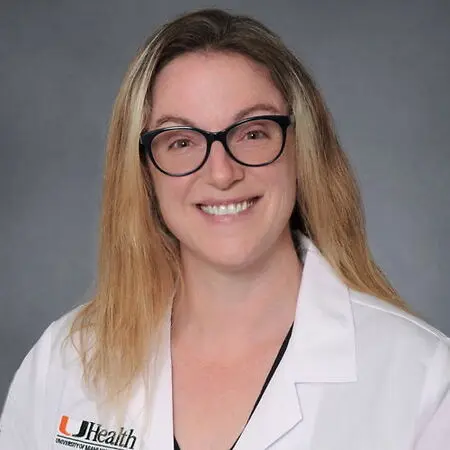Brooke Crawford, MD, MBA, FAAOS

Brooke Crawford, MD, MBA, FAAOS, is an accomplished orthopedic surgeon and academic leader, currently serving as Associate Professor of Orthopedic Surgery at the University of Miami and Sylvester Comprehensive Cancer Center. With a focus on advancing patient care and clinical research, Dr. Crawford combines surgical expertise with a commitment to education, mentoring the next generation of orthopedic specialists. Her professional approach emphasizes innovation, evidence-based practice, and compassionate patient care.
Dr. Crawford holds both an MD and an MBA, reflecting her dedication to integrating clinical excellence with strategic leadership in healthcare. She has previously served as Assistant Professor of Orthopedic Surgery at City of Hope, where she contributed to multidisciplinary care and research initiatives that advanced the treatment of musculoskeletal and oncologic conditions. Her academic and clinical work is widely recognized for its impact on patient outcomes and medical education.
Beyond her clinical and academic responsibilities, Dr. Crawford is deeply committed to fostering collaboration across the medical community and supporting patients through complex care journeys. She is known for her patient-centered approach, combining technical precision with empathy to ensure each individual receives personalized, high-quality care. Her ongoing contributions to orthopedics and oncology underscore her dedication to both advancing the field and making a meaningful difference in the lives of her patients.
• University of Miami - MBA
• Musculoskeletal Tumor Society
• International Society of Limb Salvage
• AAOS
What do you attribute your success to?
I attribute my success to a combination of early inspiration, collaborative innovation, and a commitment to giving back. My interest in orthopedic oncology began in high school and was solidified during a medical school rotation with an orthopedic oncologist. Collaborating with Caltech on photoacoustic imaging for bone analysis and receiving a grant from the Women’s Cancer Association for biomarker studies in bone metastasis have fueled my academic and research pursuits. Equally important is my dedication to community impact, including providing scholarships through Malawi’s Ministry of Education and launching a chicken coop project to create self-sustaining income opportunities, which continually reminds me that success is measured not only by professional accomplishments but also by the positive difference we make in the lives of others.
What’s the best career advice you’ve ever received?
The best career advice I’ve ever received comes from a guiding philosophy instilled by my family: pursue what you love, even when facing frustrations or obstacles in your career. This principle has been invaluable in navigating the challenges of the surgical field and the demands of academic medicine. I have learned that perseverance and resilience are essential—embracing difficulties as opportunities for growth and remaining committed to both patient care and scholarly pursuits has shaped the trajectory of my professional journey.
What advice would you give to young women entering your industry?
My advice to young women entering the medical and surgical fields is simple: if you do what you love, you’ll never work a day in your life. None of my family members are in medicine, yet we have all pursued career paths that bring us joy and fulfillment. I encourage young women to seek out strong female leaders as mentors and role models, and to recognize that dedication, passion, and resilience can open doors in even the most challenging environments. I hope my own journey demonstrates that following your passion can lead to both personal satisfaction and professional success.
What are the biggest challenges or opportunities in your field right now?
One of the biggest challenges in medicine today is the growing influence of insurance companies and hospital administration on clinical decision-making, which can sometimes undermine physician autonomy. This environment contributes to physician burnout and moral injury, placing a significant emotional toll on healthcare providers. At the same time, these challenges present opportunities to advocate for systemic improvements, promote physician-led decision-making, and develop innovative care models that balance patient needs with sustainable, fulfilling clinical practice.
What values are most important to you in your work and personal life?
The values that guide both my professional and personal life center on mentorship, integrity, compassion, and innovation. I am committed to promoting women in medicine and leadership, recognizing the impact of strong female role models and the importance of leading by example—whether mentoring residents, participating in medical graduations, or serving as a medical advisor to my family. Compassion and service are equally central, reflected in charitable initiatives such as supporting orphans in Malawi, funding scholarships, and launching income-generating projects for students. Finally, a dedication to innovation and research excellence drives my work, from grant-supported studies to collaborations on photoacoustic imaging, all aimed at advancing diagnostic speed, accuracy, and patient care.